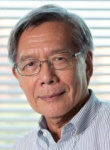- 陸潤棠(2024)。〈研究莎士比亞四大悲劇主角的驅使性悲劇行為與佛家的貪、嗔、痴〉,《華人文化研究》, 6月號,第十二卷第一期
- “Techno-Humanities : Some Trends of the Portrayal of Science in Art on the Hong Kong Stage,” International Journal of Techno-Humanities, vol. 1, no.1, September, 2022.
- 陸潤棠(2021)。《通俗與經典》,初文出版社有限公司,2021年03月01日。
- 陸潤棠 (2020) 。〈殖民主義與西方流行音樂的香港意義〉,《華人文化研究》,6月號, 第八卷第一期(2020.06) ,頁253-254。
- 陸潤棠(2020) 。〈《玫瑰﹐玫瑰﹐我愛你》的西方演繹〉,《國文天地》第三十五卷第十一期,頁四至八。
- 陸潤棠 (2018)。〈「洋為中用」: 西方文學批評詞彙的應用問題: 以「悲劇」和「浪漫主義」為例〉, 《華人文化研究》,第六卷第二期,頁111-120。
- Thomas Luk, “Arnold Wesker’s Rewriting of Shylock with a Purpose”, European Journal of Judaism, Vol. 51, No. 2, Autumn 2018: 186-195.
- 陸潤棠 (2017)。〈英文流行歌與女性主義〉,華人文化研究,第五卷第二期,頁269-272。
- 陸潤棠 (2017) 。〈語文學習的功能性和文化認知雙結合〉,《國文天地》第三十三卷第四期,頁七至九。
- 陸潤棠 (2016)。〈鬧劇的舞台演繹 — 以雷‧庫尼的《誰家老婆上錯床》香港二度演岀為例〉。《劇評》,第十四期,頁6-9。
- 陸潤棠 (2016)。〈《誰家老婆上錯床》(Whose Wife Is It Anyway?) 的鬧劇解構〉。《香港話劇團二零一六年演出導賞》,頁7-9。
- “Hollywood’s Hong Kong: Cold War Imagery and Urban Transformation in Edward Dmytryk’s Soldier of Fortune,” Visual Anthropology, Vol. 27, Issues 1-2, 138-148, January, 2014.
- 中篇小說『調景嶺的童年往事』,聯合副刊,D3,2013年,11月17日。
- 《中西比較戲劇和現代劇塲研究》(臺灣:學生書局, 2012、十月初版)。
- “From Brecht, Artaud, And the Absurd to Sha Yexin and Gao Xingjian: Two Cases of Rapport De Fait,” Comparative Literature Studies, The Penn State University, vol.48, No.1, 2011, 64-81.
- 【《魔鬼契約》中的天理與人慾】,《魔鬼契約的舞台藝術》,香港話劇團,二O一一年五月,頁二O四至二一一。
- 【電影與文學-曹禺《原野》的表現主義】曹禺的戲劇藝術講座及研討會、康樂及文化事務署及香港戲劇協會、2011年1月版、頁66-67。
- 【五、六十年代西方電影與文學的香港城市景觀】,香港文學、第310期,2010年 10月號, 頁94-98。
- “Adaptations and Translations of Western Drama: A Social-Cultural Study of Hong Kong Repertory Theatre’s Productions from 1977 to the Present,” Translatio, Paris, Federation Internationale des Traducteurs, December, 2008, pp.89-103.
- 《西方戲劇的香港演繹:從文字到舞台》,香港:香港中文大學出版社,2007年,394頁。
- “King Hu’s Raining in the Mountain as Stylization and Allegory,” Journal of Modern Literature in Chinese: Special Issue on King Hu, vol. 8, no. 1, (Hong Kong: Centre for Humanities Research, Lingnan University, 2007). pp. 21-33.
- Luk Yun Tong ed., Foreword, Journal of Modern Literature in Chinese: Special Issue on King Hu, vol. 8, no. 1, (Hong Kong: Centre for Humanities Research, Lingnan University, 2007), pp.9-18.
- 〈喜劇的舞台演繹──以王爾德《不可兒戲》的香港演出為例〉,《劇評集:香港話劇團戲劇文學研究刊物第二卷(2004-2005年度劇季)》,香港:香港話劇團有限公司,2006年,頁84-99。
- “Old Trees Grow New Branches: an Inter-Asian Adaptation of Shakespeare’s King Lear,” in East-Asian Culture and Modern Literature in Chinese, (Hong Kong: Lingnan University, 2006), pp.131-137.
- “Adaptations and Translations of Western Drama: A Social-Cultural Study of Hong Kong Repertory Theatre’s Productions from 1977 to the Present,” David C. Lam Institute for East-West Studies Working Paper Series, Paper No. 50, (Hong Kong Baptist University, April 2006), 14 pages.
- “Technology and Theatre in Post-1997 Hong Kong: Current Trends in the Portrayal of Science in Art,” Journal of Urban Technology, vol. 12, no. 2 (Routledge: Taylor and Francis, August, 2005), pp.87-99.
- 〈九七後科技和人文相結合的香港劇場〉,《戲劇藝術》(上海戲劇學院學報),2005,第一期(總123期),pp.72-76。
- “Novels into Film: Liu Yichang’s Tête-Bêche and Wong Kar Wai’s In the Mood for Love,” Chinese-language Film: Historiography, Poetics, Politics, eds. Sheldon Lu and Emile Y.Y. Yueh (University of Hawaii Press, January 2005), pp.210-219.
- 〈當代香港戲劇揉合中西表演技巧的典範〉,《中央戲劇學院學報》,2003年,第一O七期,頁114-120。
- 〈粵劇戲曲電影及粵劇戲曲藝術:題材和媒介的香港意義〉,《中華戲曲》,2002年,第二十七輯,頁289-296。
- “Hong Kong as city/imaginary in the World of Suzie Wong, love is a many splendored thing, and Chinese box “, Before and After Suzie: Hong Kong in Western Film and Literature (New Asia Academic Bulletin, no. 18, The Chinese University of Hong Kong, May 2002), pp.73-84.
- “Hong Kong as Imaginary in Western Film and Literature Before and After Suzie Wong”, co-authored with James P Rice in Before and After Suzie: Hong Kong in Western Film and Literature, eds. Thomas Y. T. Luk and James P Rice (New Asia Academic Bulletin, no. 18, The Chinese University of Hong Kong, May 2002), pp.ix-2.
- “Post-Colonialism and Contemporary Hong Kong Theatre: Two Case-Studies,” Colonizer and Colonized, eds. Theo D’haen and Patricia Krüs (Amsterdam: Rodopi b.v., 2000), pp.57-64.
- “Post-colonial Cultural Policy in Hong Kong,” Media International Australia: Culture and Policy, No, 94. (Feb. 2000), pp.147-155.
- Luk Yun Tong, ed. Europe in Hong Kong in the New Millennium (Hong Kong: Dept. of Modern Languages and Intercultural Studies, the Chinese University of Hong Kong, August, 2000).
- 〈從《哈姆雷特/哈姆雷特》說到莎劇的外語改編〉,《香港戲劇論叢》第二輯.2000年8月,101-104頁。
- “Post-Colonialism and Contemporary Hong Kong Theatre,” New Theatre Quarterly, no. 56, Cambridge University Press (Aug. 1998), pp. 366-372.
- “Contemporary Hong Kong Theatre and the Arts Policy,” Hong Kong Drama Review, 1. (November, 1998), pp.91-115.
- Chinese-Western Comparative Drama: From Comparative Literature to Post-Colonial Studies (Taipei: Camel Publishing Co., June, 1998), pp.1-70.
- Luk Yun Tong, ed. Studies in Chinese-Western Comparative Drama (Hong Kong: The Chinese University Press, 1990), 224 pages.
- “Chinese/ Western Comparative Drama in Perspective,” Studies in Chinese-Western Comparative Drama, ed. Luk Yun Tong (Hong Kong: The Chinese University Press, 1990), pp. xii-xv.
- 陸潤棠、夏寫時合編,《比較戲劇論文集》,北京:中國戲劇出版社,1988年,409頁。
- “Chinese Theatricalism and Modern Drama,” Comparative Literature Studies, vol. 24, no. 3, (Penn State University Press, 1987), pp.291-301.
- “Some Notes on Tragedy as Genre and Its Applicability to Classical Chinese Drama,” The Chinese Text, ed. Y. H. Chou (Hong Kong: The Chinese University Press, 1986), pp.15-28.
- “A Comparative Study of the Origin of Drama in China and the West,” Shanghai Drama Institute Review, issue 1 (1986), pp.103-107.
- Luk Yun Tong, et al. trans., Douwe Fokkema and Ilrud Ibsch,Theories of Literature in the Twentieth Century, (Hong Kong: The Chinese University Press, 1985).
- 《電影與文學》,台北市:中國文化大學出版部,1984年,179頁。
- “A Cinematic Interpretation of Wang Wei’s Nature Poetry,” China and the West :Comparative Literature Studies, eds. William Tay et al. (Hong Kong: The Chinese University Press, 1980), pp.151-162.
- “Wang Wei’s Perception of Space and His Attitude towards Mountains,” Tamkang Review, vol. viii, no. 1 (April 1977), pp.89-110.
|

